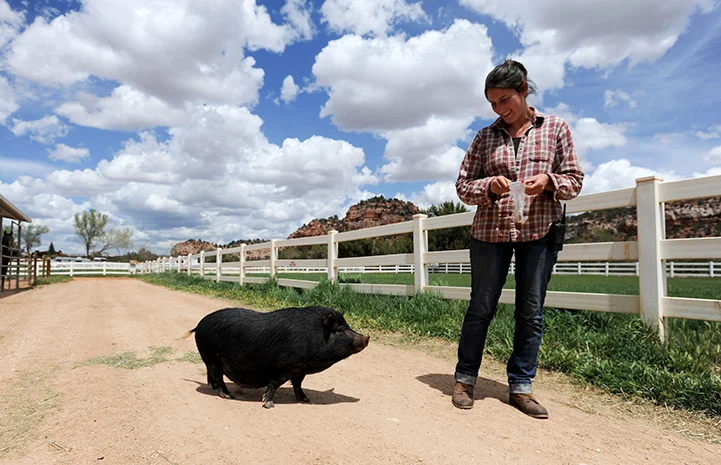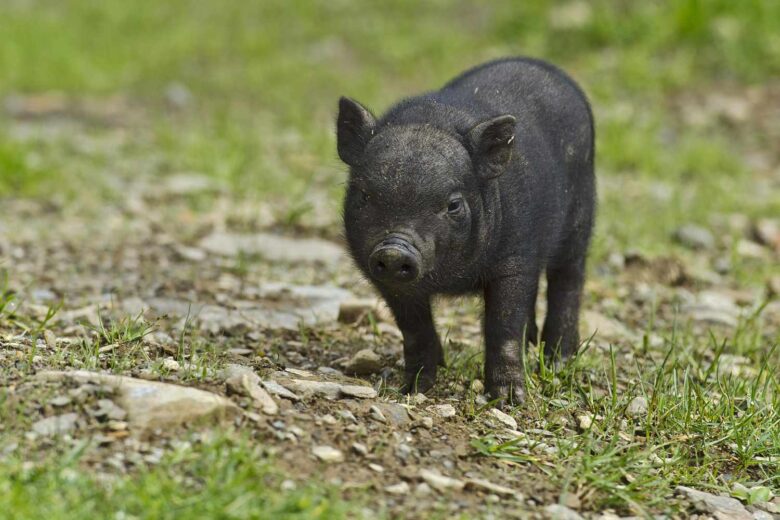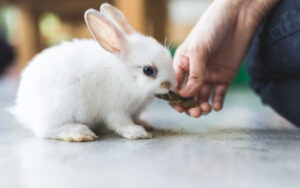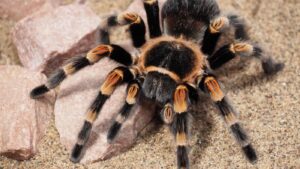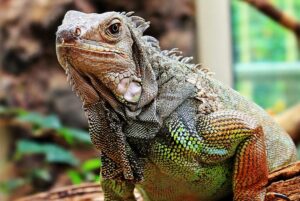Vietnamese Pot Bellied Pig
The Vietnamese pot-bellied pig, also known as the mini pig, has become a popular pet option in recent years.
Despite the name, these pigs are not truly “mini” in the sense of staying small for their entire lives. However, compared to traditional farm pigs, they are considerably smaller.
Owning a Vietnamese pot-bellied pig as a pet offers some important information:
- Size and Lifespan: While smaller than farm pigs, Vietnamese pot-bellied pigs can still grow significantly. On average, they reach a height of about 30 to 45 centimeters and weigh between 30 and 70 kilograms, depending on lineage and care. As for lifespan, these pigs can live from 12 to 20 years or even longer, requiring a long-term commitment to care.
- Environment and Space: Vietnamese pot-bellied pigs need ample space to roam and explore. While they can be kept indoors, it’s important to provide regular access to outdoor areas for exercise. They should also have appropriate shelter to protect them from extreme weather conditions. Ensure that their environment is secure and escape-proof, as they are curious and agile animals.
- Diet and Nutrition: Proper nutrition is crucial for the health of Vietnamese pot-bellied pigs. They are omnivorous and require a balanced diet consisting of a combination of pig-specific feed, vegetables, fruits, and even small amounts of animal protein. It’s important to consult a veterinarian or pig specialist to ensure that your pig’s diet is appropriate for their nutritional needs.
- Socialization and Behavior: Vietnamese pot-bellied pigs are social and intelligent animals. They can form strong bonds with their owners and enjoy human companionship. However, they also need interaction with other pigs or suitable pets to prevent behavioral issues. It’s important to dedicate time to socialize them from a young age, provide environmental enrichment, and mental stimulation to prevent boredom.
Keep reading about, Vietnamese Pot Bellied Pig
- Veterinary Care: Like any pet, Vietnamese pot-bellied pigs require regular veterinary care. It’s essential to find a veterinarian with experience in pigs and follow a schedule for vaccinations, deworming, and routine check-ups. Additionally, it’s important to be aware of signs of health problems and seek immediate veterinary attention if needed.
- Legal Considerations: Before considering a Vietnamese pot-bellied pig as a pet, it’s crucial to check local laws and regulations regarding pig ownership. Some places may have restrictions or specific requirements. Make sure to comply with local laws and fully understand the commitments and responsibilities involved in owning a pig as a pet.
Having a Vietnamese pot-bellied pig as a pet can be a rewarding and unique experience. However, it’s important to be aware of their special needs and have the commitment to provide proper care throughout their life.
Before deciding to adopt a Vietnamese pot-bellied pig as your pet, conduct thorough research, consult experts, and prepare yourself for the responsibilities involved.
Having a Vietnamese Pot Bellied Pig as a pet can be exciting! But remember, they need special care to be happy and healthy.
Before getting one, learn all about what these pigs need. Talk to an animal expert who knows about them.
Get ready to give them a comfortable home, tasty food, and lots of love. Taking care of a Pot Bellied Pig is a big responsibility, but they can make wonderful and fun companions!
With proper care and love, you and your piggy can create many happy memories together!
Read more about pets.
Read more about food storage.
